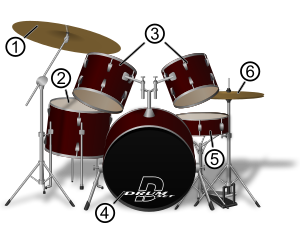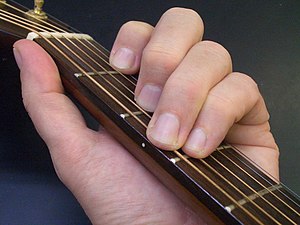We’re going to listen with a critical ear to the production and instruments in a recorded song. Even if you are not a musician, or not familiar with various instruments used in music production, being a good listener and recognizing the role each instrument plays in a song will ALWAYS give you an advantage when you are recording your songs or performing them with other people.
Let’s start with the basics of listening to a recorded song by picking a song by a band or artist that you like. Try to find a song that has a full band; quite often the instruments and the players are listed on each cut of a CD. The more instruments, the better!
One of the most obvious, up front elements of a recorded song is the drum part or percussion. If the song you’re listening to has drums, it’s important to note that they are what drives the song. That may seem obvious, but did you know that the drum part is often recorded first? The reason for this is that the rest of the instruments need to follow the drums, and not the other way around. So the drums are played at the agreed to tempo and every instrument recorded after has to maintain that same tempo as accurately as possible.

- Image via Wikipedia
So let’s discuss the parts of a drum kit first. The kick or bass drum (4) is the deep, heavy beat; the big drum that the drummer hits with a foot pedal. It is often hit less frequently than the other parts. The snare (5) has a higher pitch and is hit with a drum stick, as are the rest of the drum parts when they are played. The toms (3) are sonically somewhere between the snare sound and the kick or bass drum. They are usually played as part of a “fill”, when the drummer comes away from the snare to roll on the toms at the end of phrases or song parts. Then there are the cymbals. Crash cymbals (1) are also used for emphasis, sometimes at the beginning or end of a phrase, or emphasizing the chorus. They often referred to as the “ride” when they keep time during a chorus, for instance, and the hi-hats (6) are similarly used.
When you’re listening to the song you’ve chosen, try to focus only on the drums for the entire track. Listen to what they do and when they do it. Do they start at the beginning, or come in a little later in the intro? What’s the difference in the way they are played in the verses and then the chorus? If there is a bridge in the song, do they do something different? Pay attention to when they come in and when they pause and all of the flourishes throughout the song. When do you hear the toms, if at all? When do you hear the cymbals? Listen through a couple of times and make sure you are listening to ONLY the drums.
Now let’s focus on the bass. The bass guitar is closely associated with the drums and often recorded at the same time or just after the drums are. The drummer and bassist have a very close relationship and you’ll notice if you’ve ever seen a band play live, the bass player is often looking for signals or exchanging glances with the drummer as they move through the chord changes and fills. The bass is often the hardest instrument to hear because of its low pitch. Sometimes it plays very simple lines with long notes, and other times it might be almost rhythmic. Listen to the song you’ve chosen again, but only to the bass this time. Sometimes when I’m teaching my guitar students how to play by ear, I put on a song and get them to listen for the bass part, because that often determines what chord is being played by the guitar. So I know how difficult it is to identify. Occasionally you might confuse the sound of the bass with the low string of a guitar, but when you can zero in on the bass, listen through the whole song and pay attention to what it does. It will certainly change notes as the chords change, but does it change patterns at different times? Can you hear how it matches up sometimes with the rhythm of the kick on the drum kit? Listen through enough times that you are completely focused in on only the bass.
The recording you are listening to might have piano, or “keys’ as they are often referred to. They tend to stand out from the stringed instruments, even though they also have “strings”, but quite often they are electric pianos or keyboards with different sounds. The keyboard might be playing chords, or it might also have little melody parts or fills throughout the song. Listen to what the keyboard is doing and how it interacts with the rest of the instruments.
Guitars can be a challenge to listen to as well. There may be acoustic guitar and/or electric, and often there are both and maybe even more than one of each! Being able to distinguish how many guitars you hear is important and probably the greatest challenge. Often if there are two or more guitars, they are doing different things, but because they sound similar, it is hard for the ear to separate them at first. The electric guitar often does a solo or lead part somewhere in the song. This gives it some distinction because it’s playing notes and melodies, and not chords.
So focus in now on what the guitars (if there are any) are doing in the song. Is there just one guitar playing chords? Can you hear the difference between the electric guitar and the acoustic, assuming there are both? How do they interact with each other? Note that it is very rare, even if there are two acoustic guitars, for them to be playing the same thing. If you are a guitar player and you are jamming with others, quite often you’ll all be playing the same chords and progressions, but that rarely happens in recorded music because what would be the point of doing the same thing twice? So what the guitar players might choose to do is to play in one key on one guitar, and use a capo or barre chords to play somewhere else on the neck with the second guitar. Paul Simon used to have one guitar tuned normally, and another with the strings tuned an octave higher, so he had a very full acoustic guitar sound in his recordings.
There may be other instruments in the song you’re listening to. What are they? Extra percussion? Strings, like violins, or maybe there are electronic drums or beats, or sounds that you can’t identify right away. Quite often, recordings will have layers and layers of sounds, and others might be considered quite “sparse” in their instrumentation.
Learning to listen to other instruments and how they work together will be an important tool for you when you are thinking about what you might include in a recording of your own song. Sometimes when you’re thinking about your song, you might “hear” something that you’d like and being able to identify and articulate what that is will be a big help when you finally get in the studio.
IJ




![Reblog this post [with Zemanta]](http://img.zemanta.com/reblog_e.png?x-id=201263ca-f575-4668-8e4a-9b9ee6cf8d68)